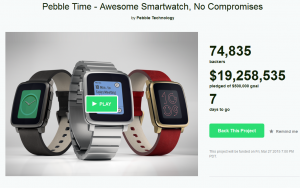Kickstarter: Online Dating for Companies
Until recently, my experience with Kickstarter was fairly limited—I loosely understood it as a fundraising platform for companies or projects. So when one of my for-profit clients announced they were launching a new product via a Kickstarter campaign, and needed extensive PR support to get more “backers” (campaign supporters who donate funds in exchange for a product or service) to reach their fundraising goal, I knew I had my work cut out for me. 
In a nutshell, Kickstarter was developed to help creative projects flourish among target audiences—it is a low-risk channel that connects early adopters and innovators by introducing new products or services online at a discounted price. The concept is comparable to a commercial version of online dating—matchmaking in commerce. Typically campaigns last for 30 days and all financial proceeds collected during this time are used to help the company cover innovation costs and the expense of bringing the product or service to market.
While Kickstarter was a novelty that received extensive publicity when it launched in 2009, it is now ubiquitous. Rising above the chatter to deliver a topline Kickstarter campaign can be a difficult task that requires a well-thought out marketing and publicity strategy. Product websites, ad buys, news releases, case studies, video, social media, bloggers, events and direct marketing executed before, during and after a campaign are all excellent promotional tactics that increase exposure.
However, I quickly learned one of the most invaluable tactics, that has consistently achieved the best results in campaigns, is word-of-mouth support from your backers and brand supporters. Getting your backers to endorse, rate and review your product or service will always produce more authentic public content than you can generate internally.

Furthermore, if the media—i.e. influential bloggers and well-known outlets (such as The Huffington Post, Forbes, Fast Company, Mashable)—see that the general public is buzzing over your campaign, they will listen and are more likely to mention you in their next blog or article. Don’t underestimate the power social media, word of mouth and the loyalty of brand fanatics. While marketing your campaign is both important and necessary, taking your Kickstarter campaign to the next level requires looking outside the walls of your company for support.
 Take Pebble Technology’s most recent Kickstarter campaign for its new Pebble Time smartwatch. The company has raised $$19,256,637—3,851% of its $500,000 Kickstarter goal—with seven days of the campaign still to go. While Pebble benefits from previous experience with Kickstarter, much of the campaign success is due to the company’s large social media following, word of mouth and ongoing media attention.
Take Pebble Technology’s most recent Kickstarter campaign for its new Pebble Time smartwatch. The company has raised $$19,256,637—3,851% of its $500,000 Kickstarter goal—with seven days of the campaign still to go. While Pebble benefits from previous experience with Kickstarter, much of the campaign success is due to the company’s large social media following, word of mouth and ongoing media attention.
Here are a few basic tips that I learned from my experience. I hope they prove useful for those of you preparing to launch a Kickstarter campaign of your own:
- Be sure there is a genuine interest for your product or service, and a real need for external funding
- Communicate with your customers before you launch your campaign, and maintain consistent communications with backers and customers during and after the campaign—do not lose contact with them simply because they have pledged for your campaign
- Ask your backers to talk about your product or service among their networks
- Remain active on your social media accounts and be sure to post consistent updates to your website and Kickstarter webpage
- Proactively identify and reach out to select media and bloggers that have a specific interest in your product or service area
- Be consistent, transparent and genuine—continue to post updates and communicate with your backers and the media well-after the campaign is completed. You never know when you will launch your next Kickstarter campaign and the ongoing exposure is vital for the success of your company.
Many of the writers and bloggers I spoke with were interested in publishing a follow-up piece on the successes and learnings from the campaign. All publicity is good publicity, after all! So you didn’t get the results you were after? My advice: reach out to your media contacts and backers anyway to tell them what you were happy with, and what you would change next time. This shows your humility and willingness to learn, and will help generate support for your next Kickstarter campaign before it’s even been conceived.
Interested in learning more about Kickstarter? Here are a couple of useful articles that may help get you started:
- 88 Creative’s Erin Bury on Crowdfunding Dos and Don’ts
- Crowdfunding isn’t just about money. It’s a publicity machine.

